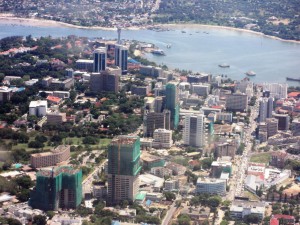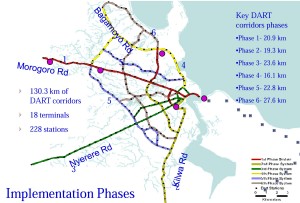
Kivukoni area of Dar-es-Salaam, with the Askari Monument to the right, and the Bank of Tanzania twin towers in the distance, near the ferry to Kigamboni. Photo Issah Michuzi http://issamichuzi.blogspot.com
Visitors to Dar-es-Salaam cannot fail to see evidence of the construction boom in the city. Perhaps most obvious is the number of skyscrapers being constructed in the central Kivukoni area (see photograph). One casualty is the Nyumba ya Sanaa (Nyerere Cultural Centre) which has been demolished to make way for a tower. The centre’s operations will be relocated to Msasani Village.
An ambitious project to try and alleviate the chronic congenstion faced by commuters is the Dar es Salaam Rapid Transit (DART) project, which was launched by President Kikwete in September and is expected to start operating in 2012. The system will use guided buses (Bus Rapid Transit) on segregated bus lanes, and dala-dalas will no longer be allowed to operate on the routes, but will operate as feeder services to the DART arterial routes.
The project will comprise six phases and a total of 130km of road plus two workshops, five main stations and six feeder stations. The first phase has just been let to Chinese firm Beijing International Engineering Group (BCEG). The route follows Morogoro Road from Kimara – Ubungo – Kivukoni with branches to Kariakoo and Morocco. 145 articulated buses, each capable of carrying 140 passengers will operate on the route, with an expected 400,000 passengers using the system every day. Subsequent phases comprise Kilwa Road, Nyerere Road, Bagamoyo Road, and orbital routes. The scheme further includes cycle tracks alongside the routes with the aim of encouraging non-motorised transport in the city. Funding for the project comes from the World Bank and UNEP as well as the Tanzanian governemnt.
The government has also released a tender for construction of a road flyover at Tazara and a bridge at Bendera Tatu that will link the junction of Nyerere Road to Bibi Titi Road, also with the aim of reducing congestion.
Private development is gradually spreading outwards from the central areas of the city, for example a large mixed use project planned for Mchikichini, Illala district, with over 1,600 multi storey flats, office accommodation and hotels, jointly funded with a Malaysian company.
Construction work is also underway at Julius Nyerere International Airport (JNIA). Speaking at the official launch of the project, Tanzania Airports Authority (TAA) Director General, Mr Prosper Tesha said that the project would involve rehabilitation of taxiways, runways and sewage system, and is set to be finished by May 2011.


Pingback: Tanzanian Affairs » BIG PROGRESS IN TRANSPORT – RAIL
Pingback: Tanzanian Affairs » TRANSPORT
Pingback: CoLab Radio » Blog Archive » Improving Traffic Flow in Dar es Salaam, Tanzania